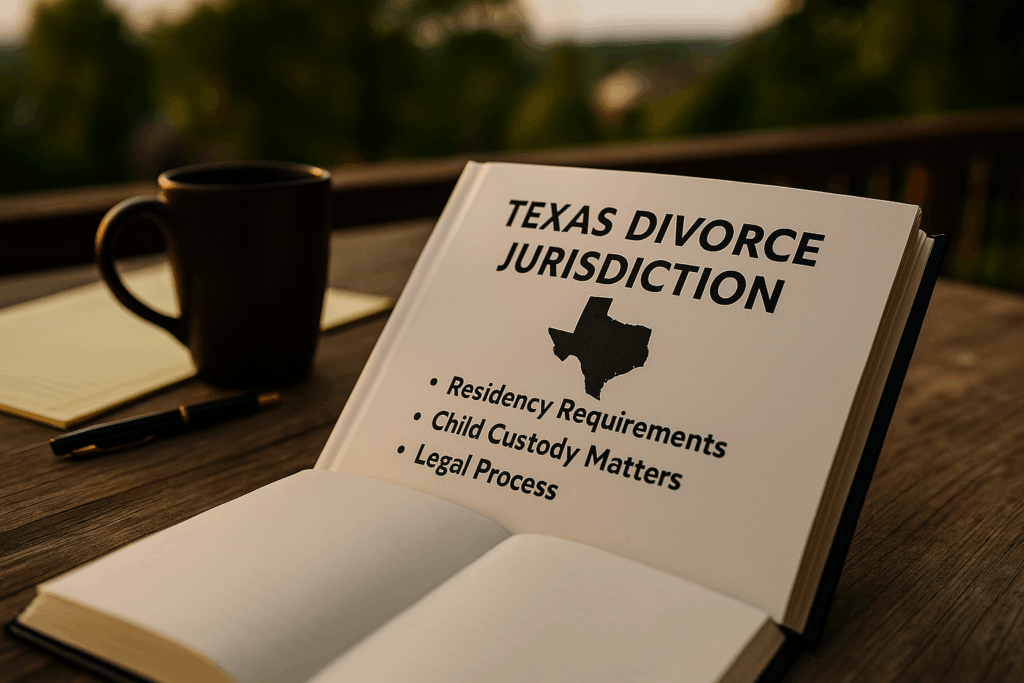
Ever had one of those moments where a legal letter shows up and suddenly your coffee doesn’t taste right? Maybe you’ve moved to a new state, started fresh, only to find out your ex just filed for divorce—in Texas. You’re staring at the paperwork thinking: “Wait… can they even do that?” It’s a common question, and one we hear a lot at our firm. Here’s the short version: When does a Texas divorce court lose jurisdiction? Usually when the residency requirements aren’t met, when the court no longer has power over both spouses, or when another state steps in with stronger legal ties to the case.
But don’t worry—we’re breaking it all down for you. This article isn’t just about legal fine print; it’s about what really happens when jurisdiction gets messy, especially for parents and kids. If you’re in the middle of a move, dealing with custody issues, or just trying to keep your child’s school life stable during a divorce, this blog is for you. You’ll learn how Texas courts handle jurisdiction, what happens when someone relocates, how it affects kids’ academic performance, and most importantly—what you can do to protect your family and your future.
Stick around. We’ll make sense of it all, without the legalese—and with the support and clarity you’ve come to expect from The Law Office of Bryan Fagan, PLLC.
Key Takeaways
- Understanding both subject matter and personal jurisdiction is essential for navigating Texas divorce proceedings effectively.
- Failure to meet residency requirements can result in the loss of jurisdiction, leading to potential delays and complications in divorce cases.
- Legal guidance is critical in managing jurisdictional challenges, ensuring proper filing, and addressing venue issues to streamline the divorce process.

Your Family’s Future Starts Here
Don’t navigate your legal journey alone. Schedule a consultation now and get the clarity and support you deserve.
Understanding Jurisdiction in Texas Divorce Cases
Understanding when does a Texas divorce court lose jurisdiction begins with recognizing the two core types of jurisdiction involved in every divorce case: subject matter jurisdiction and personal jurisdiction. Subject matter jurisdiction gives the court the legal authority to hear a divorce case, while personal jurisdiction gives the court power over the individuals involved. In Texas, divorce cases are typically handled by district courts or family district courts—but only if jurisdiction is properly established under the law.
According to Texas Family Code § 6.301, a court must have subject matter jurisdiction, which requires that at least one spouse has lived in Texas for the previous six months and in the county where the divorce is filed for at least 90 days. Without meeting these residency requirements, the court cannot legally move forward. On the personal jurisdiction side, if the respondent spouse lives out of state and lacks meaningful ties to Texas—such as real estate ownership or conducting business—then the court may lack personal jurisdiction over them, which can stop the divorce process in its tracks.
Filing in the wrong jurisdiction doesn’t just create confusion—it can lead to costly delays, motions to transfer venue, or even outright dismissal. As our attorneys often advise, verifying both residency and connection to the state before filing is essential to avoid wasting time and money. For a deeper dive into these personal jurisdiction concerns, visit When Does a Texas Divorce Court Lose Jurisdiction for a breakdown of how Texas courts handle cases involving out-of-state spouses.
If you’re unsure where or how to file, don’t risk jeopardizing your case. Our team at The Law Office of Bryan Fagan, PLLC is here to guide you through every jurisdictional challenge with clarity and care. You can also explore our blog on filing for custody in the correct Texas county to understand how venue choices impact custody and support.

Subject Matter Jurisdiction
Subject matter jurisdiction refers to a court’s legal authority. It determines the types of cases that the court can hear. In Texas, residency requirements outlined in the Texas Family Code § 6.301 determine this. In Texas, district courts and designated family courts have the authority to handle divorce cases. They possess subject matter jurisdiction in this area.
To establish subject matter jurisdiction, at least one spouse must have lived in Texas for six months before filing for divorce, and the filing spouse must have resided in the specific county for at least 90 days. Filing in the correct county is crucial to avoid jurisdictional disputes and ensure the court’s authority over your case.
Personal Jurisdiction
Personal jurisdiction is the court’s power over the individuals involved in the case. In a Texas divorce, personal jurisdiction can be established if one spouse has significant ties to Texas, such as residency or property ownership. An out-of-state spouse can also be subject to Texas jurisdiction if they have strong connections to the state, like owning property or conducting business.
Filing an Original Petition for Divorce initiates the legal process and establishes personal jurisdiction in accordance with civil procedure. Without it, the court cannot make binding decisions affecting the respondent spouse, complicating the divorce process.
Loss of Jurisdiction Due to Residency Issues
Residency requirements are one of the most critical—and often overlooked—elements in determining when does a Texas divorce court lose jurisdiction. According to Texas Family Code § 6.301, at least one spouse must have lived in Texas for the previous six months and in the county where the divorce is filed for at least 90 days. Without meeting these requirements, the court lacks subject matter jurisdiction, meaning it has no legal authority to hear the case.
If these residency benchmarks aren’t met, the consequences can be serious—ranging from delayed proceedings to outright dismissal of the case. As our family law team often advises, confirming that you meet the residency requirements before filing is essential for a smooth legal process. To better understand how Texas courts apply these rules, we recommend reviewing our detailed breakdown on Texas divorce residency requirements.
Even after a divorce has been filed, changes in residency can still pose risks. If the filing spouse moves out of Texas during the case, or if both parties relocate, the court may lose jurisdiction—especially over ongoing matters like child custody or support. Maintaining continuous ties to Texas during the divorce process is often key to preserving the court’s legal authority.
If you’re unsure about your eligibility to file or concerned about how relocation may affect your case, it’s important to speak with an experienced attorney. At The Law Office of Bryan Fagan, PLLC, we’re committed to helping families navigate these issues with clarity and care. For more guidance, explore our related article on filing for custody in the correct Texas county to see how venue and residency issues often intersect.

Failure to Meet Initial Residency Requirements
In Texas, one spouse must reside in the state for at least six months and in the filing county for at least 90 days to meet residency requirements. Failure to meet these requirements can result in jurisdictional challenges, as seen in cases where spouses moved to Texas shortly before filing for divorce.
Clear evidence of continuous residence in Texas satisfies jurisdictional requirements and avoids complications in your divorce proceedings.
Post-Divorce Residency Changes
Residency changes after a divorce filing can affect the court’s authority over ongoing divorce-related matters. This is especially true for military relocations, which can complicate residency and jurisdiction issues. Such changes can lead to potential issues in enforcing or modifying divorce orders, as the court may lose jurisdiction if the parties relocate out of state without appropriate legal adjustments.
Impact of Respondent Spouse’s Ties to Texas
Personal jurisdiction plays a pivotal role in Texas divorce proceedings—especially when one spouse lives outside the state. Under Texas Family Code § 6.305, a Texas court can only exercise personal jurisdiction over a nonresident respondent if that individual has established substantial connections to the state. These “minimum contacts” might include owning property in Texas, maintaining a residence, conducting regular business, or spending significant time in the state. Without these ties, Texas courts may lack the authority to issue binding divorce orders involving the out-of-state spouse.
If personal jurisdiction doesn’t exist, the court’s power becomes limited. For example, while a Texas court might still grant a divorce, it likely cannot rule on property division, spousal support, or custody involving the nonresident. As our attorneys have seen firsthand, many out-of-state spouses have successfully challenged Texas jurisdiction by demonstrating that their connection to the state is too minimal. To better understand your rights and potential objections if you’re an out-of-state respondent, visit our in-depth resource on Texas divorce out-of-state spouse rights and objections.
This issue becomes even more critical when child custody is involved. If the child also resides outside Texas, or if Texas is no longer considered the child’s “home state” under the UCCJEA (Uniform Child Custody Jurisdiction and Enforcement Act), the court may lack authority to issue or modify custody orders. Failing to recognize these limitations can lead to expensive and time-consuming legal missteps.
At The Law Office of Bryan Fagan, PLLC, we help families avoid these pitfalls by ensuring every case is filed with jurisdictional accuracy. Whether you’re the filing spouse or responding to a Texas divorce from out of state, our legal team provides clear, strategic guidance. For more insight on navigating related challenges, check out our article on Texas custody and jurisdiction issues when parents live in different states, which explores how courts determine the appropriate forum for custody decisions. Understanding when does a Texas divorce court lose jurisdiction is more than a legal detail—it’s key to protecting your rights and future.

Insufficient Connections
Jurisdictional challenges can arise in divorce cases concerning residency and filing requirements when a respondent spouse lives out of state. When an out-of-state spouse is involved, they must travel to Texas. This requirement complicates their situation in responding to the divorce petition.
Clients have successfully navigated these challenges through effective legal representation, emphasizing the importance of having a knowledgeable attorney.
Legal Challenges
You can challenge personal jurisdiction in your divorce case if there are no significant ties to Texas. Demonstrating the absence of significant ties, such as lack of residency or property ownership, is crucial for a successful challenge.
Filing a Motion to Transfer Venue before responding to the divorce petition is necessary to challenge improper venue in a Texas divorce case.
Exclusive Continuing Jurisdiction in Child Custody Matters
Exclusive continuing jurisdiction is a concept that often confuses parents involved in Texas custody cases, but understanding it is vital to protecting your rights. Under Texas Family Code § 155.001, a Texas court retains exclusive continuing jurisdiction over child custody orders if either the child or one parent continues to reside in Texas. This means that as long as those ties remain, Texas remains the proper legal forum for modifying or enforcing the original custody order.
However, when does a Texas divorce court lose jurisdiction in custody matters? That happens when neither the child nor either parent lives in Texas anymore, or when a Texas court determines that another state has become the more appropriate venue under the Uniform Child Custody Jurisdiction and Enforcement Act (UCCJEA). If the parties move out of state and fail to legally update or transfer jurisdiction, future custody modifications or enforcement efforts can become complicated—or even dismissed. The attorneys at our firm frequently see these issues arise when families relocate without first addressing the court’s continuing authority.
Maintaining proper jurisdiction isn’t just about following technical rules—it directly affects your ability to seek modifications, enforce visitation schedules, and ensure the stability of your child’s life across state lines. If you’re the only party still living in Texas, you may still have jurisdictional standing, but the situation must meet the criteria outlined in Texas Family Code § 155.003. For more on this topic, we recommend reviewing our guide on whether you can file for divorce in Texas if only you live here to better understand how residence affects legal authority.
At The Law Office of Bryan Fagan, PLLC, we work closely with parents to navigate the complex intersection of custody and jurisdiction—especially when relocation is involved. If you’re concerned about how moving might impact your current court orders or future custody decisions, our team is here to help. You can also explore our post on Texas custody issues when one parent relocates for additional insights into maintaining legal continuity and protecting your child’s best interests.

UCCJEA Guidelines
The Uniform Child Custody Jurisdiction and Emergency Jurisdiction Enforcement Act (UCCJEA) aims to prevent jurisdictional disputes by establishing clear rules about which state has authority in custody cases. The UCCJEA is a federal law adopted by every state except Massachusetts to resolve jurisdictional disputes in child custody cases.
Texas courts are required to enforce out-of-state custody orders consistent with the UCCJEA, and they can modify existing custody orders from another state if they have initial jurisdiction under texas law, following the texas rule, including temporary emergency jurisdiction.
Relocation of Children
Relocation of children to another state can significantly impact Texas courts’ jurisdiction over child custody matters, especially when considering the child’s home state. When a parent relocates with a child, it can complicate enforcement and modification of custody and support orders, as seen in cases where relocation created complications regarding jurisdiction.
Parents must navigate these jurisdictional issues carefully, ensuring they follow legal procedures to maintain or transfer jurisdiction appropriately. Failure to establish proper connections to Texas or the new state can lead to challenges in enforcing custody and support agreements.
Post-Divorce Jurisdictional Issues
Even after a divorce is finalized, jurisdictional questions can continue to shape your legal rights—particularly when one or both spouses relocate. Under Texas Family Code § 6.305, a Texas court may enforce a divorce decree only if it maintains personal jurisdiction over the parties involved. That jurisdiction can be lost when a spouse moves out of Texas and no longer maintains meaningful connections to the state, such as property ownership or regular visits. These jurisdictional shifts can complicate enforcement of spousal support, custody, and property division orders, especially when the non-resident spouse objects to Texas’s authority.
So, when does a Texas divorce court lose jurisdiction after a final decree? Typically, this occurs when the conditions for personal or subject matter jurisdiction are no longer satisfied. For child custody matters specifically, Texas Family Code § 155.001 provides that the original court retains exclusive continuing jurisdiction as long as at least one parent or the child resides in Texas. However, if both parties and the child have moved away, or if another state has assumed jurisdiction under the UCCJEA, Texas may no longer have authority over the case unless both parents agree to transfer or modify jurisdiction.
These complexities often catch families off guard, particularly in out-of-state situations. That’s why it’s crucial to work with a knowledgeable attorney who understands how to maintain or challenge jurisdiction strategically. To explore how legal representation can make a difference in cross-border cases, read our detailed overview on navigating the role of a Texas family law attorney in out-of-state divorce, which walks you through what to expect when divorce-related enforcement extends across state lines.
At The Law Office of Bryan Fagan, PLLC, we regularly assist clients facing post-divorce complications, especially when multiple jurisdictions are in play. Whether you’re trying to enforce an order, modify custody, or determine which state has authority, we’re here to help you make sense of it all. You can also check out our blog on how relocation affects Texas custody and enforcement to understand how to protect your family’s rights across state borders.

Modification of Orders
Modifications to divorce decrees require the court to retain jurisdiction over the matter. Jurisdictional challenges may arise when attempting to modify orders if the original court has not relinquished jurisdiction or if the parties have moved out of state.
Without substantial connections to Texas, such as residency or property ownership, a spouse may face challenges in modifying orders related to custody or property division.
Enforcement of Orders
Courts can enforce divorce orders but may face challenges if one party relocates out of state. For instance, one client faced jurisdictional issues after relocating, complicating the enforcement of their divorce decree in the new state.
If a party fails to comply with a divorce final decree, the opposing party can seek enforcement through a motion, but this cannot change the original terms of the decree.
Real-Life Examples and Testimonials
Understanding jurisdictional challenges is crucial for anyone involved in a Texas divorce, as these can significantly affect the outcome of cases. Real-life examples and client testimonials provide valuable insights into navigating these complexities.
In a notable residency dispute, a couple faced jurisdictional challenges because they failed to establish residency in Texas as required, hindering their divorce proceedings in Texas family law cases. One client encountered issues with jurisdiction after relocating out of state following their divorce, causing complications in enforcing custody disputes orders in the wrong county.
Numerous clients have praised the firm’s expertise, stating that the legal guidance provided by the Law Office of Bryan Fagan, PLLC was instrumental in navigating their jurisdictional challenges.

Example 1: Residency Dispute
A spouse faced a residency challenge after moving to Texas shortly before filing for divorce. The spouse’s short residency period raised questions about meeting residency requirements, leading to jurisdictional disputes and delays in their divorce proceedings where spouses reside.
Clear evidence of continuous residence in Texas satisfies jurisdictional requirements and avoids complications in your divorce proceedings.
Example 2: Out-of-State Move
An out-of-state move can result in a Texas divorce court losing jurisdiction over matters like spousal support and property division if the party moving does not maintain sufficient ties to Texas. The relocating spouse’s lack of personal jurisdiction may arise if they no longer reside, own property, or maintain business interactions in Texas.
Challenges related to modifying divorce orders may occur if one spouse moves out of Texas without providing adequate notice about their new circumstances. Failure to establish connections to Texas after moving can lead to difficulties in enforcing divorce agreements such as alimony and child support decrees.
Client Testimonials
Clients have praised the law office for their expert handling of jurisdictional challenges, highlighting the importance of legal guidance in navigating complex issues. Numerous clients report that legal guidance significantly alleviated their concerns about exclusive jurisdiction complexities in their divorce cases.
The positive feedback from clients underscores the crucial role of the law office in providing clarity and support through jurisdictional challenges.
Practical Advice for Navigating Jurisdictional Challenges
Navigating jurisdictional challenges in a Texas divorce requires a strategic approach. Ensuring proper filing can save time, money, and emotional stress. Proper filing meets jurisdictional requirements, avoiding procedural challenges.
Challenging improper jurisdiction requires timely objections and a well-prepared Motion to Transfer Venue. This strategic move preserves your right to contest the appropriate jurisdiction. Seeking legal guidance is crucial to avoid costly mistakes and ensure compliance with complex jurisdictional laws.

Ensuring Proper Filing
Getting the divorce filing right the first time saves money and reduces emotional stress. Proper filing in a divorce case meets jurisdictional requirements and avoids delays, especially when you file for divorce correctly.
Legal guidance can help you navigate the complexities of filing in the appropriate court and meeting residency requirements, ensuring a smooth legal process in the divorce process with the right legal guidance. Uncontested divorces can simplify this journey.
Challenging Improper Jurisdiction
To challenge jurisdiction effectively, it is crucial to raise objections at the earliest stage of the proceedings. A timely Motion to Transfer Venue is necessary to maintain the right to challenge the jurisdiction.
Consulting a family law attorney can provide you with the strategic insights needed to challenge improper venue and assert your legal rights while addressing venue challenges in the proper venue.
Seeking Legal Guidance
In Texas divorce cases, legal guidance plays a crucial role. It helps individuals navigate complex laws and avoids costly mistakes. Consulting with a qualified attorney helps avoid jurisdictional pitfalls, ensuring all legal standards are met to streamline the divorce process.
Military families should work with an attorney knowledgeable about the Servicemembers Civil Relief Act protections and the civil relief act to avoid legal hardships in divorce proceedings.
Encouragement to Seek Professional Help
Divorce can be emotionally challenging, and seeking professional help is crucial. Engaging with a therapist or life coach can provide essential support during this tumultuous time.
Joining divorce support groups offers a sense of community and shared experience, which can be beneficial for emotional recovery. Additionally, seeking legal guidance from a knowledgeable attorney ensures that you receive tailored support for your unique divorce circumstances.
Key Takeaways: Navigating Jurisdiction Requirements in Texas Divorces
Jurisdiction may sound like a stuffy legal term, but as you’ve seen, it can have a huge impact on real families—especially when kids, custody, and school stability are on the line. Whether you’re dealing with a cross-state move, a surprise filing, or just trying to make sure your child’s education isn’t derailed by legal complications, understanding where a Texas divorce court’s power begins—and ends—can make all the difference.
If your head’s still spinning a bit, that’s okay. These aren’t issues you’re expected to handle alone. Working with an experienced Texas family law attorney can help you navigate these jurisdictional twists with confidence, clarity, and a plan that puts your child’s well-being first.
So if you’re staring at paperwork wondering, “Can Texas really do this?”—or if you’re trying to protect your child’s future without upending their school year—give us a call. The team at The Law Office of Bryan Fagan, PLLC is here to walk with you, one step at a time. Because when it comes to protecting your family’s future, there’s no such thing as a small detail.
And hey—if you’ve read this far, you’re already ahead of the game. That’s half the battle.
Frequently Asked Questions: Texas Divorce Court Jurisdiction
What is the subject matter jurisdiction of the Texas divorce court?
Subject matter jurisdiction in Texas divorce courts refers to the court’s legal authority to hear and decide divorce cases. In Texas, district courts and designated family courts have subject matter jurisdiction over divorce, as long as one spouse has lived in Texas for at least six months and in the filing county for at least 90 days, per Texas Family Code § 6.301.
What is lack of jurisdiction in Texas?
Lack of jurisdiction means the court does not have the legal authority to hear a case. In Texas, this can occur if residency requirements aren’t met, if the parties don’t have sufficient ties to Texas, or if the matter involves a different court system or state that has superior jurisdiction under laws like the UCCJEA.
What is the 10 year rule in divorce in Texas?
The 10 year rule in Texas divorce law refers to eligibility for spousal maintenance. If the marriage lasted 10 years or longer, the spouse seeking maintenance may be eligible to receive it, provided they also meet other legal requirements such as being unable to support themselves due to disability or lack of earning ability.
How long does a divorce petition stay active in Texas?
In Texas, a divorce petition remains active until the case is finalized or dismissed. However, if a case is inactive for a certain period—typically several months to a year—the court may issue a dismissal for want of prosecution (DWOP). The petitioner must actively pursue the case to keep it from being dismissed.
What falls under subject-matter jurisdiction?
Subject-matter jurisdiction includes a court’s authority to hear specific types of cases. In family law, this means divorce, custody, child support, and protective orders. In Texas, district courts and certain family courts have subject-matter jurisdiction over divorce and related matters if statutory requirements are met.
What makes a divorce decree invalid?
A divorce decree may be considered invalid if the court lacked subject matter or personal jurisdiction, if there was fraud in the process, or if proper procedures weren’t followed. For instance, if a spouse was not properly served with the divorce petition, the decree could be challenged later.
What are the three factors that limit jurisdiction?
The three primary factors that limit jurisdiction are: (1) subject matter jurisdiction—the court’s legal authority to hear a certain type of case; (2) personal jurisdiction—the court’s authority over the individuals involved; and (3) geographic or territorial jurisdiction—the court’s power within a certain physical area.
What makes a court lack jurisdiction?
A court lacks jurisdiction when it either does not have authority over the subject matter of the case, does not have personal jurisdiction over the parties involved, or the case should legally be heard in a different location or state. This often results in dismissal or transfer of the case.
Can you waive subject matter jurisdiction in Texas?
No, subject matter jurisdiction cannot be waived in Texas. Unlike personal jurisdiction, which can be waived if not timely objected to, subject matter jurisdiction is mandatory and can be raised at any time—even by the court itself. Without it, the court has no power to hear the case.








